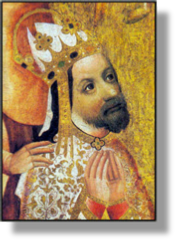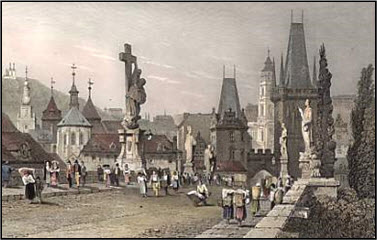


Including:
Charles of
Bohemia

THE DECLARATION OF RHENS 1338 (E3)
xxxxxAs we have seen, during the reign of Edward II there had been a long and bitter dispute between Louis IV of Bohemia and Pope John XII over the papacy’s right to approve his title as the King of Germany. After the death of Pope John in 1334, his successor, Clement VI, continued to claim this right and, in response, Louis called upon the support of seven Electors (church and lay princes in Germany). In 1338, by the Declaration of Rhens, they decreed that the pope had no rights in the matter. Five years later, however, Clement offered the German crown to Charles of Bohemia, and a war of succession was only avoided by Louis’ sudden death. Charles was crowned Holy Roman Emperor in 1355 but, by the Golden Bull, drawn up the following year, the election of the German ruler was placed totally in the hands of the Electors. The pope’s right to approve such an election was dismissed out of hand.
 xxxxxAs we have seen, during the reign of Edward II there had been a long-
xxxxxAs we have seen, during the reign of Edward II there had been a long-
xxxxxTo meet this new challenge, Louis called upon the support of the Electors -
xxxxxCharles IV was crowned Holy Roman Emperor at Rome in 1355, and the following year, having returned to Nurnberg, he summoned the Electors and drew up The Golden Bull, so called because this vast document bore a golden seal (bulla in Latin). By this Bull, the election of the German ruler was placed totally in the hands of the Electors. There was no mention of the pope’s declared right to take part in his selection and approve the election. This was simply not acceptable.
 xxxxxIncidentally, Charles IV proved an able ruler and a generous patron of the arts and sciences. He took a personal interest in the development of Prague. He made this city his capital, and it became an important political and cultural centre during his reign. From his time onwards until the eighteenth century the German imperial crown was linked to the crown of the King of Bohemia. Furthermore, his succession agreements with the Hapsburgs of Austria and the Arpads of Hungary formed the basis of the future Austro-
xxxxxIncidentally, Charles IV proved an able ruler and a generous patron of the arts and sciences. He took a personal interest in the development of Prague. He made this city his capital, and it became an important political and cultural centre during his reign. From his time onwards until the eighteenth century the German imperial crown was linked to the crown of the King of Bohemia. Furthermore, his succession agreements with the Hapsburgs of Austria and the Arpads of Hungary formed the basis of the future Austro-
Acknowledgements
Charles IV: detail from a votive painting of Archbishop John Ocko of Vlasim, c1370, by the Bohemian painter Theoderich von Prag (active 1360-
E3-


